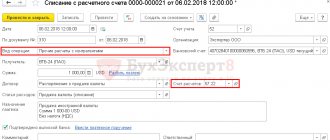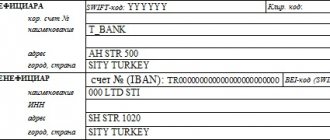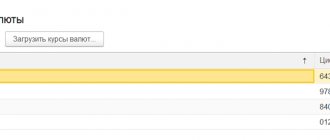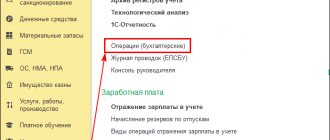In what currency can residents make payments?
Let's turn to Art. 140 of the Civil Code of the Russian Federation (hereinafter referred to as the Civil Code of the Russian Federation). According to the general rule established therein, all payments and settlements in Russia can be made in 2 ways:
- cash, in which the only acceptable means of payment are coins and banknotes of the Bank of Russia (Article 29 of the Law “On the Central Bank of the Russian Federation” dated July 10, 2002 No. 86-FZ, hereinafter referred to as Law No. 86-FZ);
- non-cash.
In both cases, the legislator designated the ruble as the main legal tender. All monetary obligations are expressed in rubles (Part 1, Article 317 of the Civil Code of the Russian Federation).
It is permissible to set the payment amount in foreign currency (FC), if in fact the settlement will be in rubles. Conversion into rubles by default occurs based on the official exchange rate valid on the day of payment (a different procedure can be agreed upon in the contract).
In addition, within a very narrow framework established by law, it is permissible to carry out settlements for obligations on the territory of the Russian Federation using IW, as well as payment documents in IW.
What is a currency clause and how to agree on it in a contract, read in the ready-made solution of ConsultantPlus. If you do not yet have access to the ConsultantPlus system, you can obtain it free of charge for 2 days.
Introductory information
In civil legislation there is a rule according to which the use of foreign currency, as well as payment documents in foreign currency when making payments on the territory of the Russian Federation, is permitted in cases, in the manner and under the conditions determined by law (clause 3 of Article 317 of the Civil Code of the Russian Federation). That is, the use of foreign currency is, in principle, allowed. But only in cases that are expressly provided for by law. Therefore, for different types of legal relations it is necessary to analyze different legal norms. Let's look at specific examples.
General procedure for non-cash currency payments
The specified procedure is defined in Art. 14 of the Law “On Currency Regulation...” dated December 10, 2003 No. 173-FZ (hereinafter referred to as Law No. 173-FZ).
Important! Residents have the right to make payments on their bank accounts in any foreign currency. It does not matter in what currency the bank account was opened - if the need arises, a conversion operation will be carried out at the rate of the corresponding bank.
For individuals, the procedure for making non-cash payments in the Internet is similar to the procedure for legal entities.
A number of by-laws establish features:
- purchases of foreign currency by legal entities and entrepreneurs (Instruction of the Bank of Russia dated August 16, 2017 No. 181-I);
- payment in currency of the authorized capital of a credit organization (clause 4.3 of the Bank of Russia instructions dated 04/02/2010 No. 135-I).
The procedure for non-cash payments in foreign currency between residents
Residents can open foreign currency accounts in authorized banks of the Russian Federation without any restrictions. However, currency transactions between residents of clause 1 of Art. 9 of Law No. 173-FZ prohibits.
But there are still a number of concessions regarding non-cash payments between them. These are the operations:
- on transfers of investment money and currency of the Russian Federation between residents’ accounts in banks located on the territory of the Russian Federation and abroad (subparagraphs “g” and “h”, paragraph 9, part 1, article 1 of Law No. 173-FZ);
- mandatory payments to budgets and settlements and transfers related to their execution;
- settlements and transfers of foreign currency for the purposes of carrying out the activities of diplomatic missions, consulates and other official representative offices of the Russian Federation, as well as those related to the maintenance of their employees;
- non-cash transfers between resident individuals from bank accounts outside the Russian Federation to Russian authorized banks;
- non-cash transfers between resident individuals who are also spouses or close relatives from bank accounts in the territory of the Russian Federation to banks outside its borders;
- settlements related to obtaining a commercial or bank loan from an authorized bank.
The procedure for cash payments in national and foreign currencies in the Russian Federation
Special rules apply to individuals: they have the right to carry out the activities listed in paragraph 3 of Art. 14 of Law No. 173-FZ currency transactions in cash (for example, donating currency to a spouse or transferring it under a will, purchasing coins for a collection by numismatists, etc.).
Note! The rules by which cash payments are made on the territory of the Russian Federation, both in the national and in the IW, are established by the Bank of Russia instruction “On making cash payments” dated December 9, 2019 No. 5348-U (hereinafter referred to as instruction No. 3073-U). They apply to individuals and a number of exceptional cases when a legal entity or entrepreneur has the right to spend cash in foreign currency (clause 1 of Directive No. 5348-U).
Clause 1 of Directive No. 5348-U allows for cash payments in national and foreign currencies between settlement participants and individuals in any amounts. But in the next paragraph, paragraph 4, limits are still established. They extend their effect to cash payments in the above-mentioned currencies made by legal entities and individual entrepreneurs, and are expressed in limiting the size of the amount - no more than 100,000 rubles. (for foreign currency - the equivalent amount at the Central Bank exchange rate on the date of cash payments). This is the so-called cash payment limit.
It works:
- for such calculations that are made within the framework of 1 agreement;
- fulfillment of civil obligations stipulated by the agreement that was concluded between the participants in cash payments and arising from it;
- issuance of cash by a credit institution, when such issuance is made upon request for the return of the balance of funds transferred to a special account with the Bank of Russia.
Agreement in foreign currency: tax consequences
USN and cash method
Let’s assume that an organization using the simplified tax system has entered into an agreement for the supply of goods with another organization. The contract specified the cost in dollars and payment in rubles.
When “simplified”, the date of receipt of income is the day of receipt of funds (clause 1 of Article 346.17 of the Tax Code of the Russian Federation). That is, it turns out that the price specified in the contract in dollars does not matter. The tax will need to be calculated based on the ruble amount received.
The situation is similar with income tax when applying the cash method - income is also determined on the date of receipt of funds (clause 2 of Article 273 of the Tax Code of the Russian Federation). Income is recognized in the same way under the Unified Agricultural Tax (clause 5 of Article 346.5 of the Tax Code of the Russian Federation). That is, differences in exchange rates are, in fact, not taken into account.
Exchange differences for income tax
Before 2015, amount differences could arise when calculating income tax. This happened when the foreign currency exchange rate was different on the date of recognition of income (expenses) and on the date of actual receipt of funds. Depending on the fluctuation of the exchange rate, receipts or expenses should have been reflected in non-operating income or expenses (clause 11.1, part 2, article 250, subclause 5.1, clause 1, article 265 of the Tax Code of the Russian Federation).
However, from January 1, 2015, the concept of “amount differences” is no longer used in tax accounting. Differences that arise when making payments under contracts in foreign currency or currency. That is, they must be taken into account as coursework. For more details, see “Starting 2015, tax and accounting rules will be closer to each other.”
Note that exchange rate differences arise when revaluing and depreciating obligations and claims denominated in foreign currency (if the exchange rate changes). Thus, since 2015, the value of claims (obligations) expressed in foreign currency is recalculated into rubles at the official rate established by the Bank of Russia, or at another rate determined by law or agreement of the parties, on the date of termination (fulfillment) of claims (obligations) and (or) on the last day of the current month, depending on which date came earlier (clause 8 of Article 271, clause 10 of Article 272 of the Tax Code of the Russian Federation).
VAT deductions and invoices
If the purchased goods are intended for use in transactions subject to VAT, then the buyer, if there is an invoice, has the right to accept the amount of “input” VAT for deduction after accepting the goods for registration (clause 2 of Article 171, paragraph 1 of clause 1 of Article 172 of the Tax Code RF). However, the amounts of VAT that are accepted for deduction are not adjusted if the cost of goods established in foreign currency is paid in rubles (paragraph 5, clause 1, article 172 of the Tax Code of the Russian Federation).
Positive or negative differences in the amount of VAT that arise for the buyer when paying should be taken into account as part of non-operating income or expenses on the basis of Article 250 or Article 265 of the Tax Code of the Russian Federation (paragraph 5 of clause 1 of Article 172 of the Tax Code of the Russian Federation).
Special mention should be made about the preparation of invoices. The fact is that the name of the currency is a mandatory detail of the invoice (clause 6.1, clause 5, clause 4.1, clause 5.1, article 169 of the Tax Code of the Russian Federation). The name of the currency and its digital code are indicated on line 7 of the invoice. For example, when issuing an invoice in rubles, line 7 of the invoice must be filled out as follows: “Russian ruble, 643.”
An invoice can be drawn up in a foreign currency only if the goods (work, services) are paid for in the same currency (Clause 7, Article 169 of the Tax Code of the Russian Federation). So, if the invoice is issued in euros or dollars, then in this line you should indicate: “euro, 978” or “US dollar, 840”. But issuing an invoice in . i.e., in principle, not provided for.
In this regard, if the agreement is drawn up in currency or conventional units, and payments are made in rubles, then the invoice should be issued in the currency of the Russian Federation (since the tax base is calculated in rubles, clause 4 of Article 153 of the Tax Code of the Russian Federation).
Source documents
Please note: monetary measurement of accounting objects is carried out in the currency of the Russian Federation (Part 2 of Article 12 of the Federal Law of December 6, 2011 No. 402-FZ “On Accounting”). If, for example, salaries in foreign currency are reflected in the primary documents, then problems with the recognition of labor costs when calculating income tax cannot be ruled out. To recognize such expenses, we recall that the expenses must be documented (Article 255 of the Tax Code of the Russian Federation). It is possible that inspectors will consider the primary documents filled out “in foreign currency” to be inconsistent with the legislation of the Russian Federation. This may lead to problems with the deduction of VAT.
Making payments in foreign currency abroad
The procedure for settlements through accounts opened outside the Russian Federation is stipulated by the legislator in Art. 12 of Law No. 173-FZ.
According to the general rule, paragraph 6 of Art. 12, without any restrictions, settlements can be made between residents (legal entities and individuals) with funds credited to their accounts in banks outside the Russian Federation. But there are still a number of exceptions. Their complete list is given in paragraph 1 of Art. 9 of Law No. 173-FZ.
At the same time, the legislator provided for a number of exceptions to the established ban. As for currency transactions between residents outside the Russian Federation, these exceptions are listed in clause 6.1 of Art. 12 of Law No. 173-FZ.
The resident must notify the territorial tax authority (at the place of his/her own registration) about all actions with the investment account on a bank account outside the Russian Federation (opening, closing, changing details).
Settlements between residents and non-residents in foreign currency: features and nuances of the procedure
Art. 6 of Law No. 173-FZ allows for currency transactions between residents and non-residents. However, not without some reservations. They are listed in Art. 11 of the said law, namely:
- Only specially authorized banks can carry out the procedure for the purchase and sale of investment money and checks (including traveler's checks) with the nominal value indicated in them, expressed in foreign currency.
- When buying and selling foreign currency in cash, as well as checks with an IW face value, the currency regulation authority (Central Bank of the Russian Federation) imposes special requirements on credit institutions regarding the preparation of documents (for example, see Article 20 of Law No. 173-FZ).
In addition, the separate rules by which cash payments are made in the currency of the Russian Federation and foreign currency between resident legal entities and non-residents are discussed in Part 2 of Art. 14 of Law No. 173-FZ.
Converting salaries into foreign currency
Let us immediately draw attention to two important provisions of labor legislation: 1. Terms of remuneration (including the size of the tariff rate or official salary, additional payments, allowances and incentive payments) must be included in the employment contract (Part 1 of Article 57 of the Labor Code of the Russian Federation) ; 2. Payment of wages is made in cash in the currency of the Russian Federation, that is, in rubles (Article 131 of the Labor Code of the Russian Federation).
However, there is no prohibition on setting the payment in currency (for example, dollars or euros). It turns out that you can pay wages in rubles, for example, at the dollar exchange rate on the day of payment.
Risks
If we talk about risks, then it is worth mentioning one more requirement of the Labor Code of the Russian Federation: “the employer is obliged to provide employees with equal pay for work of equal value” (paragraph 6, part 2, article 22 of the Labor Code of the Russian Federation). It would seem, how does this relate to currency? However, imagine that one employee has a salary in euros, and another in rubles. With the same functionality at the end of the month, they should, in theory, receive the same amount. But if the exchange rate changes, it may turn out that ruble earnings will differ significantly.
By the way, official bodies also believe that setting wages not in rubles does not comply with labor legislation and infringes on the rights of workers (letter of Rostrud dated March 11, 2009 No. 1145-TZ). The rationale is this: a change in the exchange rate of the ruble against a foreign currency can lead to a deterioration in the employee’s remuneration conditions (for example, if the exchange rate depreciates and wages in rubles become less).
In this regard, setting wages in foreign currency is dangerous. It cannot be completely ruled out that the employer may be held administratively liable under Art. 5.27 of the Code of Administrative Offenses of the Russian Federation (which provides for fines or suspension of activities).
Principle of repatriation
Important! The special conditions regime applies when making payments by residents in the IV within the framework of foreign trade activities (Article 19 of Law No. 173-FZ). This is the so-called principle of repatriation, which imposes certain responsibilities on residents (Parts 1 and 1.1 of this article):
- ensuring receipt of currency (national and foreign) due in accordance with the terms of agreements and contracts;
- repatriation to the Russian Federation of funds paid by non-residents for goods, work, services and information that were never imported into the Russian Federation, fulfilled, transferred (failure to fulfill this condition even provides for liability under Article 193 of the Criminal Code of the Russian Federation);
- receiving into your accounts from non-residents the currency due under loan agreements.
Price tags in e. or currency
Let's assume that the seller decides to indicate prices in currency or conventional units. However, information about goods (works, services) must necessarily contain the price in rubles. This is the requirement of paragraph 4, paragraph 2, art. 10 of the Law of the Russian Federation dated 02/07/92 No. 2300-1 “On the protection of consumer rights.”
At the same time, regarding the question of indicating prices in foreign currency or currency. e. there are different approaches. On the one hand, Rospotrebnadzor (Information dated December 17, 2014) does not exclude the possibility of establishing the contract price in rubles in an amount equivalent to a certain amount in foreign currency (cu).
On the other hand, there are precedents in judicial practice when indicating prices in foreign currency or currency. e. was recognized as contrary to the requirements of the legislation on the protection of consumer rights (see, for example, resolution of the Federal Antimonopoly Service of the Ural District dated March 13, 2007 No. F09-1474/07-S1). And for this, administrative liability is possible on the basis of Article 14.8 of the Code of Administrative Offenses of the Russian Federation. In this regard, setting prices in currencies or conventional units is quite risky.






